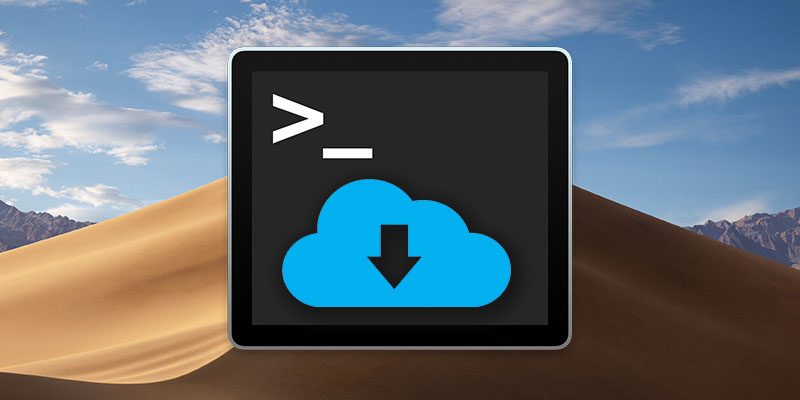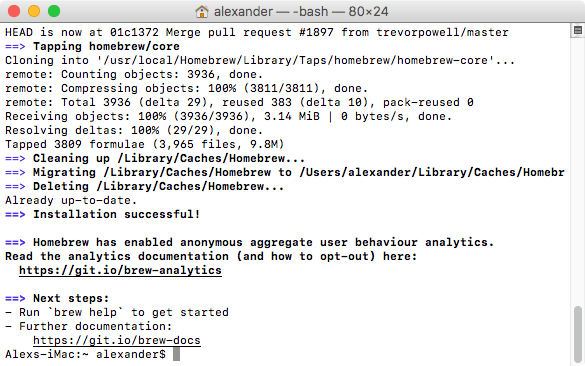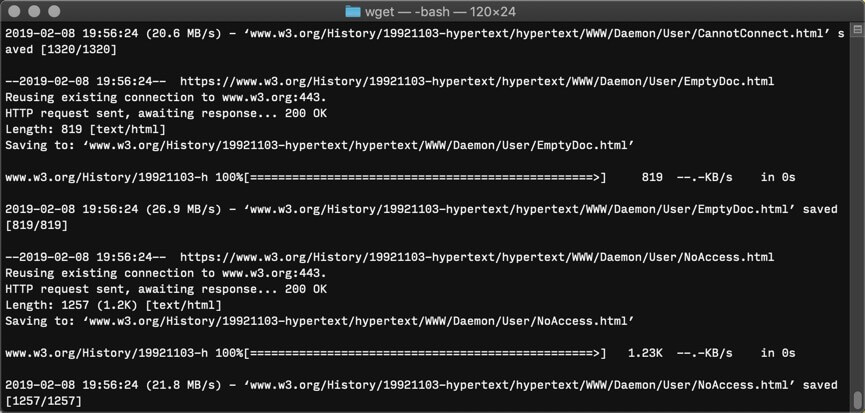How to Install and Use wget on Mac
| 첨부 '4' |
|
|---|

wget is a non-interactive command-line utility for download resources from a specified URL. Because it is non-interactive, wget can work in the background or before the user even logs in. The program was designed especially for poor connections, making it especially robust in otherwise flaky conditions. While wget isn’t shipped with macOS, it can be easily downloaded and installed with Homebrew, the best Mac package manager available.
1. Download and Install Homebrew

To install Homebrew, open a Terminal window and execute the following command taken from Homebrew’s website:
Install Homebrew
mac:~ hooni$ /usr/bin/ruby -e "$(curl -fsSL https://raw.githubusercontent.com/Homebrew/install/master/install)"
mac:~ hooni$ brew update
mac:~ hooni$ brew doctorYou might notice the command called curl, which is a different command-line utility for downloading files from a URL that ships within the Ruby installation included on macOS.
2. Installing wget
Once it has completed installing itself, we will use Homebrew to install wget. In Terminal, run the following command to download and install wget:
Install wget
mac:~ hooni$ brew install wgetYou’ll get live updates on the progress of downloading and installing whatever dependencies (software prerequisites) are required to run wget on your system.
If you already have Homebrew installed, be sure to run brew update to get the latest copies of all your formulae.
3. Using wget

The purpose of wget is downloading content from URLs. It’s a quick and simple non-interactive tool for downloading files from any publicly accessible URL.
Download a single file
Like the similar command curl, wget takes a remote resource from a URL and saves it to a specified location on your computer. The command’s structure works like so:
mac:~ hooni$ wget -O path/to/local.copy http://example.com/url/to/download.htmlThat will save the file specified in the URL to the location specified on your machine. If the -O flag is excluded, the specified URL will be downloaded to the present working directory.
Download a directory recursively
To download an entire directory tree with wget, you need to use the -r/--recursive and -np/--no-parent flags, like so:
mac:~ hooni$ wget -e robots=off -r -np https://www.w3.org/History/19921103-hypertext/hypertext/This will cause wget to follow any links found on the documents within the specified directory, recursively downloading the entire specified URL path.
That command also includes -e robots=off, which ignores restrictions in the robots.txt file. In general, it’s a good idea to disable robots.txt to prevent abridged downloads.
Other wget Flags
In addition to the flags above, this selected handful of wget’s flags are the most useful:
Controlling the download
wget -X /absolute/path/to/directorywill exclude a specific directory on the remote server.wget -nHremoves the hostname directories. Remember, the hostname is the part of the URL that contains the domain name and ends in a TLD like “.com.” For example, the folder named “www.w3.org” in our previous example would be skipped, starting the download with the “History” directory instead.wget --cut-dirs=#skips the specified number of directories down the URL before starting to download files. For example,-nH --cut-dirs=1would change the specified path of “ftp.xemacs.org/pub/xemacs/” into simply “/xemacs/,” reducing the number of empty parent directories in the local download.wget -R index.html/wget --reject index.htmlwill skip any files matching the specified file name. In this case it will exclude all the index files. The * character can be used as a wildcard, like “*.png,” which would skip all files with the PNG extension.wget -i filespecifies target URLs from an input file. The input file must be an HTML file or be parsed as HTML with the additional flag--force-htmlwget -nc/wget --no-clobberwill not overwrite files that already exist in the destination.wget -c/wget --continuewill continue downloads of partially downloaded files.wget -t 10will try to download the resource up to 10 times before failing.
Adjusting the level of logging
wget -denables debugging output.wget -o path/to/log.txtenables logging output to the specified directory instead of displaying the log-in standard output.wget -qturns off all of wget’s output, including error messages.wget -vexplicitly enables wget’s default of verbose output.wget --no-verboseturns off log messages but displays error messages.
Conclusion
While that should cover the majority of wget use cases, the downloader is capable of much more. For a full description of wget’s capabilities, you can review wget’s GNU man page online.
[출처] https://www.maketecheasier.com/install-wget-mac/
| 번호 | 분류 | 제목 | 글쓴이 | 날짜 | 조회 수 |
|---|---|---|---|---|---|
| 309 | Develop |
[c] 마우스 따라다니는 고양이 - 네코95 (WinAPI)
|
hooni | 2013.04.23 | 7945 |
| 308 | Develop |
[c] 로또(Lotto) 번호 생성기
|
hooni | 2013.04.23 | 7175 |
| 307 | Develop |
[c] 레포트용으로 제출했던 여러 소스코드 모음
|
hooni | 2003.04.23 | 8088 |
| 306 | Develop | [c] 라인수 입력받아 마름모꼴 출력하기.. | hooni | 2003.04.23 | 6869 |
| 305 | Develop |
[c] 디피-헬만 키교환(Diffie–Hellman key exchange) 샘플 코드.. ㅋㄷ
|
hooni | 2013.04.23 | 9111 |
| 304 | Develop |
[c] 도스 공격(DoS Attack) 프로그램
|
hooni | 2013.04.23 | 11580 |
| 303 | Develop |
[c] 도메인(호스트)으로 IP정보 알아오기.. (nslookup과 비슷)
|
hooni | 2013.04.23 | 6934 |
| 302 | Develop |
[c] 도메인 소켓(Unix Domain Socket) UDP
|
hooni | 2013.04.23 | 9284 |
| 301 | Develop |
[c] 더블(이중) 연결리스트 예제..
|
hooni | 2013.04.23 | 7470 |
| 300 | Develop | [c] 달팽이 배열? 인지 먼지.. ㅋㅋ | hooni | 2013.04.23 | 7130 |
| 299 | Develop |
[c] 단어 입력/수정 프로그램 소스
|
hooni | 2003.04.23 | 7028 |
| 298 | Develop | [c] 단기과정[01/24] 정렬 알고리즘 | hooni | 2003.04.23 | 6955 |